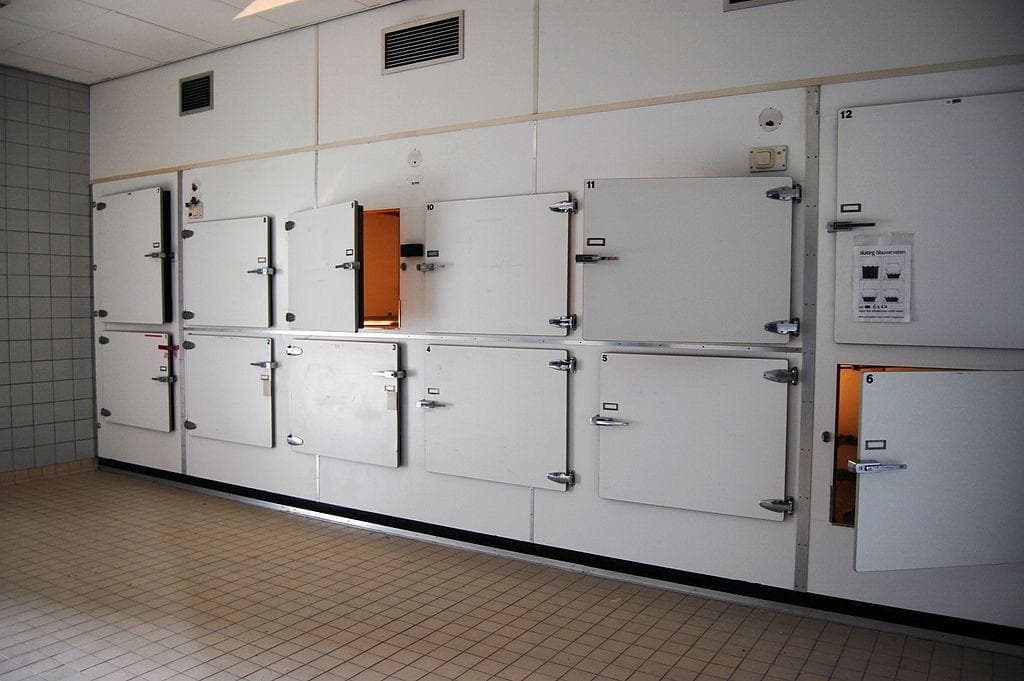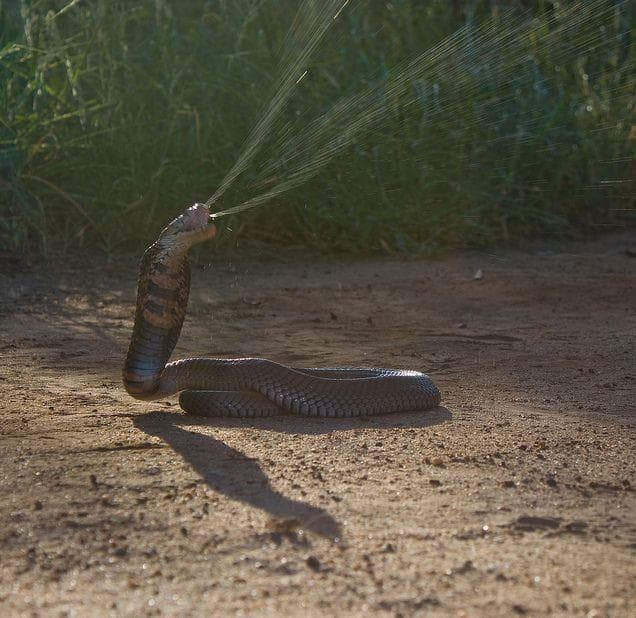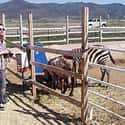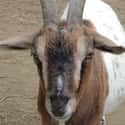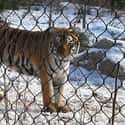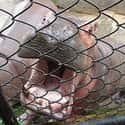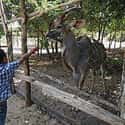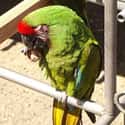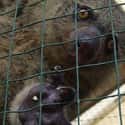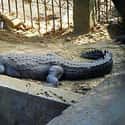-
(#1) Beware The Roadside Zoo
Chances are, the animals at a roadside zoo are treated even less humanely than those at regular zoos. Animals are often kept in concrete pens, with nothing more than an old tire or a log to stimulate their minds. The objective of roadside zoos are to attracted passersby on busy roads, and often go to great lengths to entice travelers inside - sometimes to the detriment of the animals. These zoos are not accredited.
-
(#2) Some Sanctuaries Aren't What They Seem
Sanctuaries may seem like a humane place for animals in need of a home to go, but not all sanctuaries are the non-profit operations they claim to be. If a sanctuary breeds outside of conservation efforts, it isn’t really a sanctuary. Rehabilitation centers and sanctuaries should never breed animals for display. The biggest issue with fake animal sanctuaries is there are no regulations over the word sanctuary, meaning any operation can say it is one without actually giving quality care to the animals.
-
(#3) Some Zoos Pretend Animals Are Actually Other Animals To Draw Customers
At the end of the day, zoos are meant for entertainment, and they aren't afraid to use stand-ins. Zoos have been known to have fake or knock-off versions of animals. One Chinese zoo was caught displaying a Tibetan mastiff posed as an African lion, giant sea cucumbers and rats posed as snakes, and dogs dressed up as leopards and timber wolves.
-
(#4) Captive Animals Suffer From “Zoochosis”
Captive animals often become depressed, bored, and lonely. This condition is called “zoochosis.” It is so rampant in zoos that animals are often given mood-altering drugs, such as Prozac. Many of the symptoms are things we have all seen at the zoo before; symptoms include head bobbing, constant pacing, over-grooming, bar biting, and even self-mutilation. The term stems from a 1992 documentary by Bill Travers that examined the harsh effects of captivity on animals.
-
(#5) Many Zoos Get Rid Of "Surplus" Animals
Many zoos have surplus animals - unwanted animals for which there is no more space, or animals that have ceased to be cute or useful for breeding purposes. These animals are sometimes killed, a practice referred to as "zoothanasia," fed to fellow zoo habitants, or sold to other zoos or dealers. While this practice is not common in certified US zoos, it is overseas and at unregulated operations.
-
(#6) Almost Anyone Can Start A Zoo
Unaccredited zoos are a large problem, at least in part because they are so easy to set up. Any person who privately possesses wild animals can obtain an exhibitor license under the Animal Welfare Act and establish a zoo, but only 10% of the 2,000 zoos in the U.S. are accredited by the Association of Zoos and Aquariums. While some states have restrictions on what kind of wild animals you can possess, not all do. And some states are easier than others to establish privately-owned animal operations.
-
(#7) Some Animals Actually Live Longer (And Are Safer) In The Wild
Often zoos will claim to provide safer environments for animals than the wild, resulting in longer life spans. However, the stress of an unnatural environment can severely shorten an animal's life span. Zoo elephants live about 16 to 18 years, while wild elephants can live 50 to 70 years. Orcas at Sea World have an average life expectancy of 13 years, while wild orcas have an average life expectancy of 30 to 50 years old, and can live to be up to 100.
-
(#8) Some Zoos Are Lacking In Animal Knowledge
Though zoos make it a priority to appear professional and educational, zoos themselves often lack important zoological understanding. Many zoos do not have the ability or proper training to care for their animals or breed them, resulting in unhealthy animals and early death. Some zoos have virtually no education of the animals they're caring for, and because of lack of knowledge, become death traps of any animals that go there.
-
(#9) Zoo Animals Eat The Equivalent Of "TV Dinners"
In the wild, animals eat plants and hunt prey. In captivity, they basically eat wet cat food. Zoos are feeding animals pre-packaged and heavily processed foods, which are sometimes described in scientific literature as "formulated foodstuffs." This food doesn't even need to be chewed, and has resulted in poor dental health in carnivores like tigers, who need use their sharp teeth in order to keep them clean.
-
(#10) Reintroduction Programs Rarely Actually Bring Animals Back To The Wild
Many zoos boast about their breeding programs, but they never mention how unsuccessful the overwhelming majority of these programs are. Not only do reintroduction programs fail to familiarize animals to their natural environments, they rarely end up reintroducing animals at all. Despite the number of endangered species topping the thousands, only 16 of 145 reintroduction programs ever, worldwide, have actually reintroduced animal populations to the wild. Most of these were government programs, not zoos.
-
(#11) Unhappy Animals Sometimes Escape
Some animals are so unhappy in captivity they will risk life and limb in desperate attempts to free themselves. There are countless examples of animals like lions, alligators, and zebras escaping their confines. A Dallas Zoo gorilla named Jabari made an escape attempt by jumping over the walls and moats of his enclosure, only to be fatally shot by police. A witness later confessed that teenagers were taunting him by throwing rocks.
-
(#12) It's More Expensive To Maintain Animals in Captivity
It is about 50 times more expensive to maintain elephants in zoos than to protect equivalent numbers of elephants in the wild. Using the money for conservation programs instead not only allows the animals to live in their natural habitat, it also helps keep ecosystems in balance.
-
(#13) We Don't Learn Much From Animals In Captivity
While zoos often have brief information available about the species they hold, visitors are not learning much about them. Since zoo attendees spend just a few minutes at an animal’s enclosure they gain little, if any, understanding of the animals, and their observations are limited to those possible in an unnatural, stressful environment. A study released in 2014 showed zoos actually had a negative educational impact on children.
-
(#14) Captive Breeding Can Be A Recipe For Disaster
Captive animals don’t choose their mates. They are sometimes artificially inseminated and their babies can be sold or traded to other zoos. Animals, like us, have strong attachments to their children and a pregnant female's emotional state can result in an unhealthy pregnancy. Thus, the breeding practices of zoos often result in miscarriages, stillbirths, or the mother’s rejection of her young.
-
(#15) Petting Zoos Can Cause Illness
People have become seriously ill - and have sometimes died - from diseases they’ve picked up at petting zoos. E. Coli and salmonella bacteria are common at petting zoos. While infection is quite rare, E. Coli can cause serious kidney failure. Some states have passed laws regulating petting zoos, including cleanliness standards, but even those are not able to curb possible infection. The CDC estimates more than 73,000 people a year become sick from petting zoos, and about 60 people die on average.
-
(#16) Regular Feedings Instead Of Hunting Leads To Stress
Animals like bears or large cats are used to hunting in the wild, but their natural source is replaced with regular feedings of processed food in the zoo environment. This causes stress in these animals, and studies have found that more naturalistic carcass feedings reduce stress and related behaviors.
-
(#17) The Zoo Conservation Myth
Zoos claim to help with conservation. However, hardly any zoo registers their animals on an international species database and most zoo animals are not even endangered species. Since the animals are living in captivity with frequent human contact, it would be extremely difficult for the to ever return to the wild. What's more, is many zoos acquire animals based on the conversation myth, saying they're keeping the animals to rebuild a healthy population, but mostly give the offspring of these animals to other zoos.
-
(#18) Animals Returned To The Wild Often Don't Survive
Most zoo animals released in the wild don't survive, even if they were relatively healthy and cared for while they were at the zoo. Because they are often deprived of habitats resembling their natural ones, especially in terms of climate and fauna, they cannot assimilate properly and will be abandoned or starve once released into the wild. They also have less fear of natural predators, and often have lack the natural social skills of their wild kin required for them to successfully mate.
-
(#19) Caged Animals Get Fat
It should come as no surprise, considering the enclosed nature of a zoo animal's environment and their frequent feedings, that it is extremely common for animals at the zoo to become obese, endangering their health. About 40% of elephants in captivity are obese, and a spokesperson for the Copenhagen Zoo admitted that "basically all of the animals except the birds" were overweight.
New Random Displays Display All By Ranking
About This Tool
More and more people like to visit zoos in different places, especially children. It is very tempting to see wild animals that can only be seen on TV with their own eyes. Whether adults or children, every time they go to the zoo, they will attract by the diverse animals, but few people think about the feelings of those animals who have been kept in cages for their entire lives.
You may not know the secrets in the zoo for the rest of your life. The random tool reveals 19 secrets that no zoo would like their visitor to know, let's take a look at the truth about the zoo.
Our data comes from Ranker, If you want to participate in the ranking of items displayed on this page, please click here.



